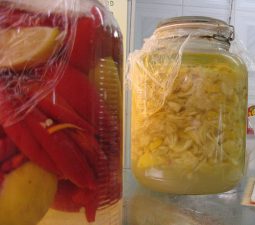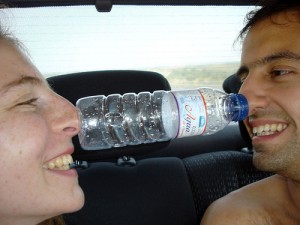 Not only does Jibal Faifa Water Company’s bottled water contain excess levels of cancer-causing chemical, but plastic bottles are the bane of the environment
Not only does Jibal Faifa Water Company’s bottled water contain excess levels of cancer-causing chemical, but plastic bottles are the bane of the environment
It comes as no surprise that water, that miracle of life without which we would quickly shrivel up and die, dominates the headlines. We are either witch-hunting BP for its role in polluting numerous water sources, marveling at Libya’s man-made river, or watching cautiously as Egypt struggles to provide water to its citizens. Then there is the water that comes in bottles. We assume its safe, but is it really?
How safe is Saudi’s bottled water?
Arabian Business reports that the Saudi Food and Drug Authority (SFDA) found that the Saudi water bottling company Jibal Faifa Water Co. in the Sabya Governorate is producing bottled water that is high in bromate.
Bromate was “first found to cause tumors in rats in 1982. Subsequent studies on rats and mice confirmed that it causes tumors of the kidney, thyroid, and other organs,” according to the Center for Science in the Public Interest (CSPI). Additionally, the United Kingdom and Canada banned Bromate in the early 1990s.
Produced by the Jazan Development Company (Jazadco), the SFDA has recommended that production of the bottled water is halted, and that it is removed from shelves.
The lowdown on PET
Although compelling, Bromate is not the only reason to rethink drinking water out of plastic bottles.
The Island Haven Institute (IHI) writes that “according to John Hopkins researcher Rolf Halden there are no dioxins in plastics. However, he states the phthalates in plastics (PET is a phathalate) can leach into your water or food if the container is heated” – a daunting prospect given the country’s powerful heat waves.
“Phalates are environmental contaminants that can exhibit hormone-like behavior by acting as endocrine disruptors in humans and animals,” says Halden.
What’s more, the PET used to manufacture the plastics produces 100 times the amount of emissions generated as a byproduct of producing glass and take thousands of years to decompose in already crowded landfills, according to IHI.
Before turning to plastic for your drinking water, check the local newspapers and water authorities for information about water safety, and then make your decision. If it can be trusted, tap water is much less destructive to the environment than the 2.5 million bottles thrown away in the US alone, according to cleanair.org.
:: image courtesy of Klearchos Kapoutsis and story via arabianbusiness
More Hydrological News:




“…he states the phthalates in plastics (PET is a phathalate) can leach… “
To say PET is a phthalate is maybe technically correct, but this whole sentence is very, very misleading. The phthalates that are of concern are plasticizers such as dioctyl phthalate (DOP). These are small molecules that you can draw on a chalkboard. PET is an exceedingly large molecule that cannot be drawn on a chalkboard without the use of some abbreviations. This difference is important because the ability of a molecule to leach is inversely proportional to its size – small ones leach more easily than large one.
So again, PET is a phthalate, but it isn’t a phthalate of concern. To be concerned about all phthalates is an overly broad generalization.
John, thanks for your comment. After being corrected about the finer points of science, I have been meaning to adjust this statement. So I appreciate yours.
Thank you for your comments; I agree that this is a contentious issue.
Plastics are recyclable, but in some countries, 90% of those used end up in landfills instead; there, they will not decompose for thousands of years.
Plastics are also made from oil-based products, which means that the environmental toll to make them in the first place is hefty.
The chemicals present in the plastics themselves and in the water – as we’ve learned about Saudi – contribute to the many reasons to find smarter alternatives for delivering safe drinking water…
What a load of misleading information here.
Back off bottled water.
You are saying the bottles are bad for the environment, that’s not true, plastic bottles are recyclable and the toxic chemicals added to tap water is far more damaging to the sea life than all the plastic in the world.
what we should be banning is tap water because it is no longer water with all the chemicals added to it, it is harming our health and our future children, it is harming all the sea life and the whole environment at large.
I agree that we should ban bottling tap water or water that is not natural mineral water as that is the only healthy water to drink.
Cheers to safe and clean bottled natural mineral water.